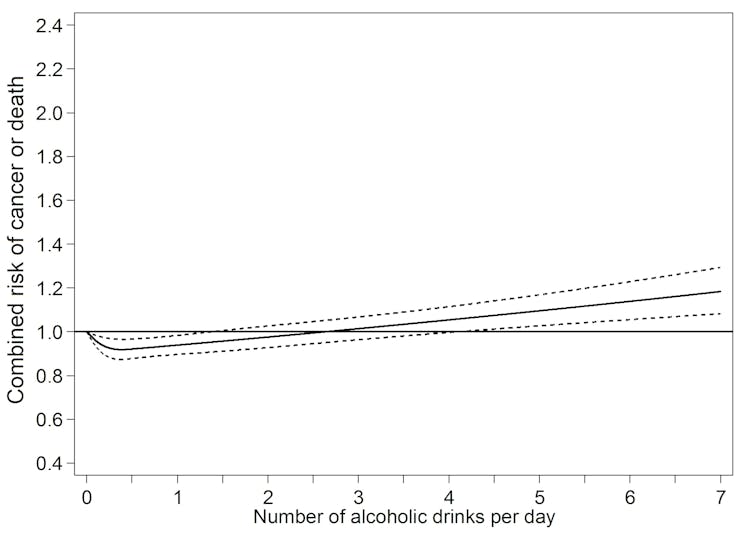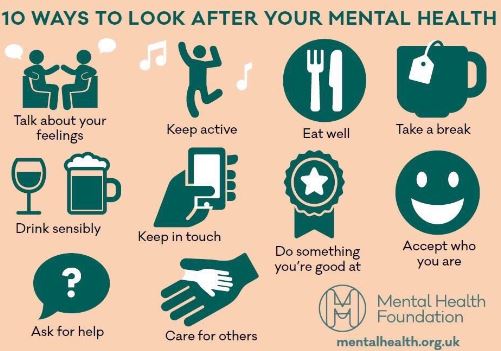Just like our physical health, whether we have a medical diagnosis or not, we all need to take care of our mental health.
Recently was World Mental Health Day. It is important we all take the time to implement these practices to look after our own mental health.
The Mental Health Foundation have signposted ten ways you can look after your mental health.
1. Talk About Your Feelings
You’re not alone; talk to someone you trust. Sharing a problem is often the first step to recovery.
I am not a self-made man. I got a lot of help…
My life was built on a foundation of parents, coaches, and teachers; of kind souls…; of mentors…; of idols… my mother… my father…
You can admit that you can’t do it alone. I certainly can’t. No one can.
– Arnold Schwarzenegger, in the forward to ‘Tools of Titans’
Those are the people who can pick you up when you fall down. You become more resilient them better the social support you set up around you.
You can not do that unless you become someone who is sharing your true thought, feelings, desires and dreams with other people.
2. Keep Active
It is well known that exercise is a panacea for most health conditions and that includes mental health.
A recent meta-analysis (a large study combining other studies together) with a total of 266,939 participants reported that being active for 150 minutes or more per week was associated with a 20 per cent reduction in risk for depression.
Preferably exercise or be active in a communal space, either outside or in a gym. This will give your the social interactions that help bread better mental health.
Being around other people makes us feel better. Especially when everyone is working to achieve a goal, whether that is the same goal or not.
Research shows that after just one session people have a greater chance of experiencing positive events and achievement throughout that day, and also into the next day.
Exercise has been proven to reduce symptoms of depression, especially if done at moderate to vigorous intensity levels.
3. Eat well
The link between poor mental health and nutritional deficiencies has long been recognised by nutritionists working in the complementary health sector. A lack of essential nutrients is known to contribute to the onset of poor mental health in people suffering from anxiety and depression, bipolar disorder, schizophrenia and ADHD.
Nutritional psychiatry is a growing discipline that focuses on the use of food and supplements to provide these essential nutrients as part of an integrated or alternative treatment for mental health disorders.
Make sure that you eat a greater variety of food stuffs for good brain health. Avoid a diet of heavily processed food containing artificial additives and sugar.
It is now known that many mental health conditions are caused by inflammation in the brain, causing brain cells to die. This inflammatory response starts in our gut and is associated with a lack of nutrients from our food such as magnesium, omega-3 fatty acids, probiotics, vitamins and minerals that are all essential for the optimum functioning of our bodies.
Recent research has shown that food supplements such as zinc, magnesium, omega-3, and vitamins B and D3 can help improve people’s mood, relieve anxiety and depression.
One study found that a daily magnesium citrate supplement led to a significant improvement in depression and anxiety, regardless of age, gender or severity of depression.
Omega-3 fatty acids are another nutrient that is critical for the function of the central nervous system and a lack has been associated with low mood.
Probiotics, live bacteria in your digestive system, have been found to be associated with a significant reduction in depression and anxiety. Vitamin B complex and zinc are other supplements found to reduce the symptoms of anxiety and depression.



4. Take a break
This does not mean stop working then pick up your phone and check social media. Even Facebook tells us that being on social media can be bad for our health, however some people use it to create support networks, so social media’s relationship with mental health is controversial.
Take a real break. Maybe engage in some mindfulness or meditation. Perhaps do some yoga.
Yoga’s psychological benefits may be linked to the functioning of the vagus nerve. This, the tenth cranial nerve, is the longest of the autonomic nervous system which is responsible for the body’s unconscious functioning such as breathing and circulation, which in turn is also directly linked to social competence and beneficial emotional regulation.
In one study, participants performed two simple yoga poses for two minutes. Afterwards, they reported improved feelings of energy, sense of power, and self-esteem, even more so than those that performed ‘power poses’ for two minutes.
Yoga has been proven to help individuals suffering from mental health problems, such as depression, anxiety, obsessive-compulsive disorder, post traumatic stress disorder, and schizophrenia.
If yoga is not your bag then simply engaging in some mindful breathing and relaxation will be beneficial, to active the vagus nerve.

OpenStax College, CC BY
5. Drink alcohol sensibly
People use alcohol to relax and as a tool to interact with their friends, which is good for mental health, but some persons use alcohol to numb or mask their emotions. Alcohol misuse is a major public health concern, and there is considerable evidence that heavy drinking is associated with a range of negative health outcomes including depression.
There is a J-shaped relationship (see graph below) between alcohol and combined risk of cancer or death. This is likely to be applicable for depression and other mental health issues. This is a bit of a ‘chicken and the egg’ problem, which came first? Do those with mental health issues drink excessively or does alcohol cause or make mental health issues worse?

In an interview with Tim Ferris, billionaire Sir Richard Branson revealed that he often takes 1-2-months, sometimes longer, breaks from alcohol when he feels overwhelmed or loses focus. He personally believes that those who have down moments in their lives, it can invariably be traced back to alcohol. If it’s good enough for an overachieving, hyperactive billionaire, it may be worth considering.

It is likely the lowest risk of mental health issues will be in those who consume less than seven alcoholic drinks per week (less than one drink per day) (equal to about the alcohol found in a medium strength bottle of beer) compared to teetotallers or heavier drinkers. Heavier drinkers (who drank more than three drinks per day) are likely to have the highest risk of mental health issues and have a 20% higher risk of prematurely than light drinkers.
Light drinkers may also be at a lower risk as they tend to be wealthier. Money can not buy happiness nor mental wellbeing but they may have better access to health care and psychiatric support, and follow other lifestyle behaviours that are beneficial for mental health, like being more physically active.
If you are going to drink perhaps consider with what you mix your alcohol. The conclusion of a meta-analysis of 13 studies in the Journal of Studies on Alcohol and Drugs was that people who add energy drinks to alcohol have a higher risk of injury from fights, compared to those who drink alcohol straight. An experiment reported in the Journal of Consumer Psychology showed that people who drink vodka and Red Bull cocktail can increase perceived intoxication and lead to risky behaviours, however these effects are not driven by the ingredients, they are linked to beliefs. It is a psychological effect, not a physiological one.
6. Keep in touch
Loneliness and social isolation are associated with depression, decreases in cognitive abilities and Alzheimer’s disease. Research shows that people who feel lonely have more health problems, feel worse and even die at an earlier age. It is not uncommon for a persons whom has lost their partner to die soon afterwards, from a ‘broken heart’. Government officials take loneliness so seriously in the United Kingdom that there is a minister for loneliness.
Humans evolved to be in tribes. We hunted in small hunter-gather groups, where social cohesion could help protect from predators. Being alone without support in the wild is dangerous – and stressful.
Read more:
It Takes a Tribe To Raise Child And To Ensure They Have A Long Happy Life… Part 1… and Part 2
Governments Have Destroyed The Tribe: We Do Not Know Who or What We Are Anymore
Acute stress, like exercise, can be healthy but in the long term, uncontrolled stress becomes a problem. Persistent stress elevates levels of cortisol in the brain. Cortisol may make neurons in the brain less active and even lead to cell death. It contributes to inflammation that is connected to many health issues including depression.
Loneliness also decreases the hormone named oxytocin. Oxytocin is often referred to as the “love hormone” because it is involved in relationships and pair bonding. It is linked to reduced stress. For instance, it’s associated with decreases in levels of norepinephrine, the “fight or flight” hormone, that is associated with anxiety. Oxytocin seems to decrease activity in the amygdala, a part of the brain that activates whenever there’s a perceived threat and become anxious.
Being connected to people has regularly been shown to be one of the most potent buffers against poor mental health. The neurologist Viktor Frankl wrote:
For people who think there’s nothing to live for, nothing more to expect from life … the question is getting these people to realise that life is still expecting something from them.
7. Do something you’re good at
Feeling accomplished will naturally release feel good hormones like serotonin.
Or, if you can not find something that you are good at, do something you enjoy. Do something! Get started. Even if you are bad at it.
Anything worth doing is worth doing badly
– G.K. Chesterton, writer and poet
People often want to do something “perfectly” or to wait for the “perfect time” before starting. But this can lead to procrastination, long delays or even prevent us from doing it at all, which can lead to stress and anxiety.
Whatever you can do, or dream you can, begin it; Boldness has genius, power and magic in it.
– Goethe, German writer and poet
8. Accept who you are
People with mental health problems are often not kind to themselves.
Start forgiving yourself for any mistakes you make. If you feel like you’ve embarrassed yourself in a situation, don’t criticise yourself. Recognise the impulse to blame yourself, then drop the negative thought and redirect your attention back to the task at hand.
– Hunter S. Thompson
9. Ask for help
This relates heavily with the first point, share your feelings. You need to speak your truth. You need to ask for help. You need to enlist other persons around you. You need to ask them to support you. Because without a support team around you, you are always going to plateau or dip.
10. Care for others
If you spend most of your day thinking about yourself and your problems, without considering with someone else in your mind, then you’re at a high risk of poor mental health. We can not be truly happy until we know that someone else needs us and depends on our productivity or love.
Doing something for someone else takes your mental spotlight off of you, your anxieties and your worries, and places it onto others, and how we can make a difference to them. See the Frankl quote above.
Knowing that someone else needs you makes it easier to endure the toughest times. You’ll know the “why” for your existence and will be able to bear almost any “how”.
How can you make yourself important in someone else’s life?
If you do not have a child or elderly parent to care for you could try volunteering or doing work that might benefit future generations, even if these people never know it was your work, it doesn’t matter because you will know.
This will help you realise the uniqueness and importance of your life.
There you have it! Ten things to consider when managing your mental health. Things that everyone should endeavour to implement in their lives.
Enjoy!
Scott
PS. If you know anyone who you think could benefit from reading this, please Share via the Social buttons at the sides and top of the post.




I pay a quick visit day-to-day some blogs and websites to read content, except this blog offers quality based articles.|